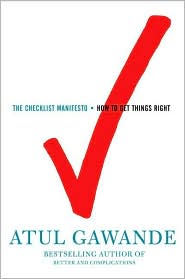Atul Gawande is a surgeon who has written this book about checklists but it is not a book on how to make checklists for shopping lists or planning weddings nor is it a book about productivity. This is a book on using checklists as a tool to deal with modern technology’s extreme complexity to avoid disasters and death.
This came to the forefront with the development of the B-17 Bomber in the 1930’s. The plane was very complex and difficult to fly under the best of conditions. When things went wrong pilots made very obvious mistakes that led to crashes. In response Boeing developed very simple checklists that when used cut down on the number of crashes considerably.
He also talks about modern buildings. The incidence of failure of high rise buildings has been ridiculously low. Much of that is because of the use of checklists during the design and construction of the buildings. Everybody knows that know one person can think of everything in such a project so they depend on codes and lists in order to ensure the safety of the buildings.
Dr. Gawande really blasts his fellow doctors for being so resistant to standards of care and checklists for even the simplest of procedures. Standards and checklists that have been proven to work if followed. The problem is the ego of many doctors to hand power briefly over to somebody else for the briefest of times in order to make sure that the procedure is to be done.
The problem, as almost everyone who has ever dealt with the medical profession knows, is that doctors are treated like royalty and everyone else, nurses, technicians, and other highly educated, trained, and experienced professionals and especially the patients, are there at the doctor’s bidding. I asked a nurse last year when a family member was hospitalized what her number one problem was in her job. She said that, besides the workload, trying to explain to patients and their family members that she couldn’t tell them anything about test results or treatment plans or anything else. They had to wait for the doctor to tell them that and then telling the patients that she had no idea when the doctor was coming by, that in fact he or she was going to come by when they pleased and not a minute before. Further, they could page or call him or her till the cows come home and it would not do any good. She said that the whole floor of the hospital was full of people wondering and waiting when the doctor was going to come.
She said it as pretty frustrating. I think that there has to be a better way.
What do you think?
Oh yeah, I rate this book 2.5 stars out of 4. I mean its a good book but it is still only about checklists. At least it was short. But really, isn’t 200 pages like a graduate degree in checklists?


Q – Do you know how many Doctors (or College Professors) it takes to change a light bulb?
A – CHANGE??!!??
Fascinating. Thanks for posting this. Documented, step-by-step procedures are used all over aviation.
Don’t think I’d pick the book up for lazy Saturday afternoon reading but I did enjoy your review of it! 🙂
Hmmm…well, being that I worked in healthcare/at a large health system for 10 years, I certainly have an opinion about physicians, but I don’t think there’s enough room in this comment section for my thoughts. I’d love to discuss it sometime…physician attitude/demands were part of the reason I left my job, which I really enjoyed (I wasn’t in patient care).
Great review. Oh-and the part about the pilots and their checklists, I’ve seen that first hand. My dad is a retired Air Force col., he’s a list maker. We had our own plane and I remember my mom sitting in the co-pilot seat reading down the checklist and him saying “check.” Old habits are hard to break.
Yogi, I’ve got nothing but respect for Atul Gawande. I’ve been reading his stuff for years. He’s very intelligent, and a great writer. He writes a lot for the New Yorker.
I can’t wait to get this one.